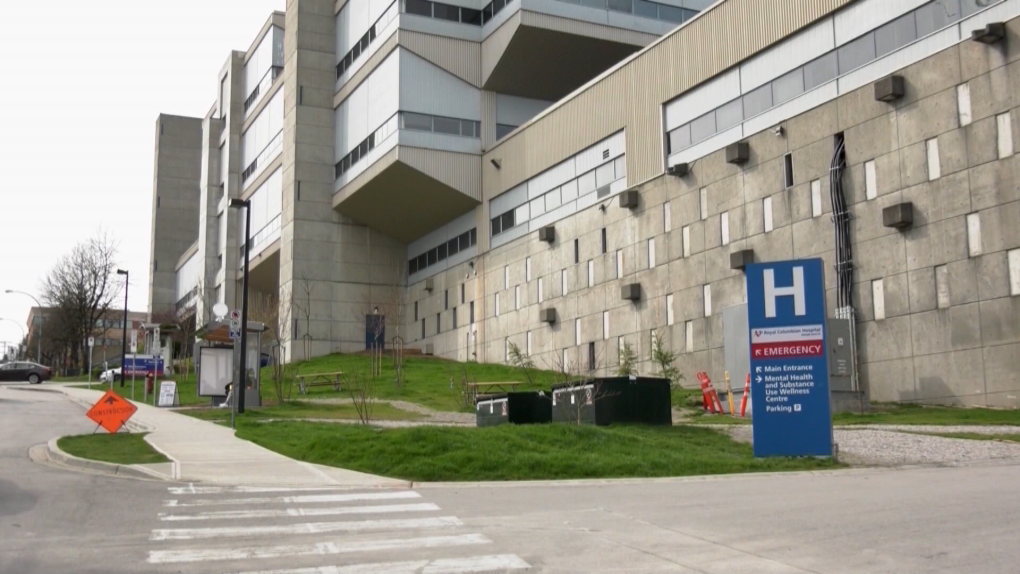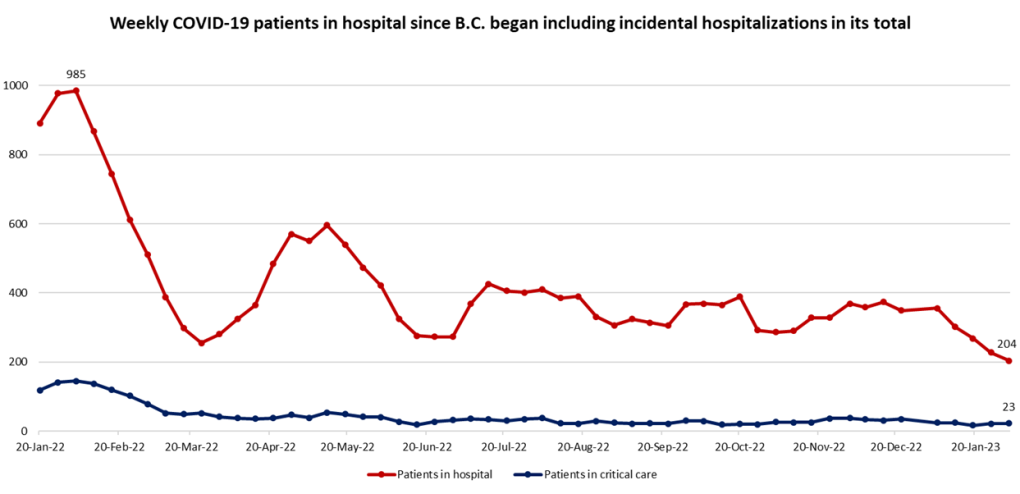Number in hospital with COVID-19 in B.C. hits another new low in latest update

The number of patients with COVID-19 in B.C. hospitals declined again this week, once again reaching a low not seen since before the province began including incidental hospitalizations in its count.
The B.C. Centre for Disease Control reported 204 test-positive patients in hospitals across the province Thursday, down from 228 last week, which was itself the lowest level seen in more than a year.
 The number of people in hospital with COVID-19 in B.C. on Thursdays since the province switched to a "hospital census" model is shown. (CTV)
The number of people in hospital with COVID-19 in B.C. on Thursdays since the province switched to a "hospital census" model is shown. (CTV)
The BCCDC began including incidental cases – meaning those in which a person was admitted to hospital for something other than COVID-19 and tested positive once they got there – in its total in January 2022, near the peak of the first wave of Omicron-variant infections.
The count of hospitalized people on Thursdays peaked at 985 shortly after the switch in reporting methods, but had never fallen below 255 in a weekly update until last week.
Health officials estimate that between 40 and 50 per cent of hospitalizations reported each week are caused by severe cases of COVID-19, while the rest are incidental.
Applying the estimated proportion of non-incidental cases provided by public health officials to the current count suggests roughly 82 to 102 people are currently hospitalized because of the disease.
Tracking the data back to before the switch, the last time the BCCDC reported fewer than 204 people in hospital with the coronavirus was Dec. 28, 2021, when the total was 193.
That total, however, was intended to reflect all patients with severe enough cases of COVID-19 to require hospitalization.
The last time the BCCDC reported a hospitalized population below 100 was in August 2021, before the Omicron variant had been named.
OTHER NEW DATA
Thursday's update from the BCCDC also came with continued declines in new hospital admissions (which are different from the currently hospitalized population) and newly confirmed infections.
There were 293 new, lab-confirmed cases of COVID-19 during the week of Jan. 22 to 28, the most recent "epidemiological week" for which data is available.
That's a substantial decrease – roughly 28 per cent – from the 408 new cases the BCCDC reported last week for the period of Jan. 15 to 21.
Weekly caseloads are not considered representative of the total transmission of COVID-19 in B.C., because they only include the results of lab-based PCR tests, which are available for people with coronavirus symptoms in only a limited number of situations.
Still, though experts estimate that the official case count is off by roughly 100-fold, it has generally moved in the same direction as other indicators like hospitalizations and wastewater surveillance since the province adopted its current, limited testing strategy.
New hospital admissions tell a similar story this week. The BCCDC reported just 73 of them for the week ending Jan. 28, down from 104 initially reported last week for the period ending Jan. 21.
Last week's total has since been revised upwards to 123, and this week's total will be revised upwards in next week's update.
This week's total is beginning at a lower point than last week's did, however, and the revised total for last week is the second-lowest the BCCDC has reported since it switched to weekly data updates in April 2022.
Wastewater surveillance data, which captures a much broader sample of the population than the official case count, had not been updated at the time of writing Thursday.
The most recent wastewater data available on the BCCDC website showed a declining trend in coronavirus concentrations across all treatment plants, though the rate of decline was slowing in some regions.
CTVNews.ca Top Stories

Quebec nurse had to clean up after husband's death in Montreal hospital
On a night she should have been mourning, a nurse from Quebec's Laurentians region says she was forced to clean up her husband after he died at a hospital in Montreal.
Northern Ont. lawyer who abandoned clients in child protection cases disbarred
A North Bay, Ont., lawyer who abandoned 15 clients – many of them child protection cases – has lost his licence to practise law.
Bank of Canada officials split on when to start cutting interest rates
Members of the Bank of Canada's governing council were split on how long the central bank should wait before it starts cutting interest rates when they met earlier this month.
Maple Leafs fall to Bruins in Game 3, trail series 2-1
Brad Marchand scored twice, including the winner in the third period, and added an assist as the Boston Bruins downed the Toronto Maple Leafs 4-2 to take a 2-1 lead in their first-round playoff series Wednesday
Cuban government apologizes to Montreal-area family after delivering wrong body
Cuba's foreign affairs minister has apologized to a Montreal-area family after they were sent the wrong body following the death of a loved one.
'It was instant karma': Viral video captures failed theft attempt in Nanaimo, B.C.
Mounties in Nanaimo, B.C., say two late-night revellers are lucky their allegedly drunken antics weren't reported to police after security cameras captured the men trying to steal a heavy sign from a downtown business.
What is changing about Canada's capital gains tax and how does it impact me?
The federal government's proposed change to capital gains taxation is expected to increase taxes on investments and mainly affect wealthy Canadians and businesses. Here's what you need to know about the move.
New Indigenous loan guarantee program a 'really big deal,' Freeland says at Toronto conference
Canada's Deputy Prime Minister Chrystia Freeland was among the 1,700 delegates attending the two-day First Nations Major Projects Coalition (FNMPC) conference that concluded Tuesday in Toronto.
'Life was not fair to him': Daughter of N.B. man exonerated of murder remembers him as a kind soul
The daughter of a New Brunswick man recently exonerated from murder, is remembering her father as somebody who, despite a wrongful conviction, never became bitter or angry.






























